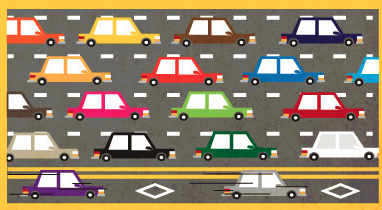Last week, three D.C. judges made a game-changing legal decision that would allow giant media conglomerates to block or slow down any content they want on their networks. The judges struck down a 2010 order from the FCC (America’s telecom policymaker — their equivalent of our CRTC) that forced U.S. Internet providers to abide by “net neutrality” rules that forbid them from blocking or slowing online content.
Much has been made about the FCC’s decision in the media — but couched within the court details, the technicalities, and the jargon is one important point: This decision could be the beginning of the end of the open Internet in the U.S.
And we’ve been hearing from Canadians in droves via Facebook, Twitter, and Google+ asking us about the decision, why it’s important, and what it means for Canadians.
So here’s a brief overview of what you need to know — and why the fight for net neutrality is, essentially, a fight for Internet freedom.
What is net neutrality?
First, let’s get down to the basics. Under the principle of Net Neutrality, all Internet traffic should be treated equally. What this means is that your ISP should not control how you use the Internet in order to boost its own profits — so it cannot give preferential treatment to certain companies, users, modes of communication, or specific kinds of content over others.
Imagine a world where a highway represents the network and cars on that highway represent Internet traffic. In a neutral environment, any driver can choose which lane on the highway it wants to drive down, without obstruction, so long as the lane is open.
But what if certain groups built fast lanes for a certain group of cars only? Or if the manufacturer of a certain car brand decided to set up toll booths for every car on the highway that it did not manufacture so that they had to pay to use the road. What if these gatekeepers decided to impose themselves entirely on the information superhighway and decide not to let any cars on the highway at all? That’s what a world without net neutrality could look like.
Why should I care?
Thanks to this recent decision, U.S. telecom giants now have the legal right to block or slow down anything that runs online on their networks. That means websites, webpages, blogs, videos (yes, even Netflix), applications, cloud-based technology services, web technologies and more. They can even choose to block or slow down your ability to view this article, all while charging you a fee to do so. That’s right, they could charge websites a hefty fee for faster content delivery after deliberately slowing down user access to the page.
That means that Americans’ ability to access content is severely limited, as is the ability for smaller businesses to operate on a level playing field with the giants, due to higher pricesstifling innovation. And you might have already made the connection – but by monitoring Internet traffic in order to block or throttle websites, these telecom giants are now able to more effectively — and more openly — invade your privacy.
But isn’t this happening in the U.S.? Why should Canadians care?
Threats to net neutrality do not have borders. A major battle to save net neutrality is happening here in Canada right now and your OpenMedia.ca team is right there in the trenches fighting for you.
In November 2013, OpenMedia.ca community member Ben Klass filed an official complaint with the Canada’s telecom regulator, CRTC, against big telecom company Bell’s alleged practice of stifling competing mobile services by making apps and web services more expensive for Canadians in order to give its own content an unfair advantage — unfairly forcing people to use Bell-owned media content and services.
OpenMedia has officially intervened in this case with the help of our legal friends at CIPPIC — and we’re encouraging Canadians to join us by speaking out at https://OpenMedia.ca/SaveOurNet
In short, if you care about Internet access, choice, affordability, and privacy – net neutrality affects you. The more who speak up, the stronger our voice will be – make your voice heard today at: https://OpenMedia.ca/SaveourNet.
Image: Online MBA, “15 Facts about Net Neutrality.”



